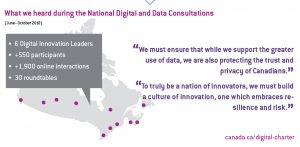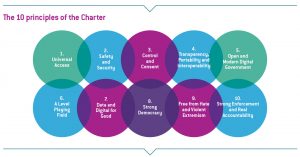Calls for increased control for Canadians over their personal data, enhanced enforcement and penalty powers for the Privacy Commissioner and long-needed updates to federal and provincial privacy laws have been made loud and clear by citizen advocacy groups, technology analysts as well as legal and academic scholars across the country.
Now, the federal government is making similar noises about what’s being called a digital charter for Canada, and it wants to put in place a set of rules or principles to increase or simply establish reasons for consumer trust in the digital economy.
It is a necessary first step, but any further progress may be undercut at election time – now like 90 days away.
The federal Minister of Innovation, Science and Economic Development, Navdeep Bains, introduced the Digital Charter proposal along with ideas for reforming the country’s Privacy Act, and plans to consult stakeholders about technical and legal considerations that eventually will also open the digital discussion to the Canadian public.
 (Of course, just which government the Canadian public will speak with has yet to be determined. Election results will play a huge role in whether or not the Digital Charter ever comes into effect.)
(Of course, just which government the Canadian public will speak with has yet to be determined. Election results will play a huge role in whether or not the Digital Charter ever comes into effect.)
The need for something like a digital charter of rights is nevertheless clear: Canadians are not alone in the world when they state concerns about how their personal data is being collected, used and disclosed by businesses and governments alike. Giant digital corporations do not appear to be subject to regulations that are tough enough to protect Canadian data; in some cases, companies appear more than ready to profit from our private and personal information whether we willingly and knowingly hand it over or not.
If the digital business environment is suspect, so too, the social media world: Online bullying, hate speech, fake news and the like have so contaminated the digital sphere that mutual respect, trust and belief systems are at great risk.
So the proposed Digital Charter includes ten principles (see below) for building a foundation of trust for the digital domain, hoping that Canadians will (again?) to be able to trust that their personal data security is well-protected.
One important proposal is to strengthen existing consumer consent mechanisms. Entities that gather personal data should face increased requirements to describe exactly who has access to the data and how they will use it.
The government also wants to address the automated decision-making that goes on in the digital world by making companies tell users what factors they use to make their decisions (from approving a mortgage to granting immigrant status to recommending another movie you should watch).
The proposals come up short when it comes to just how much confidential commercial information a company must share, but any insights into automated decision-making by machine learning and artificially intelligent systems could be a big step forward in understanding how our data is used.
A new approach to data collection and analysis would also stop companies from bundling consent into performance or service contracts, and that too is supposed to enhance consumer choice and awareness.
There are other Charter proposals that say Canadians should have new data portability rights so they can transfer personal information (in standard and accessible data formats) from one entity to another, such as for banking or financial activities.
In order to implement any or all of the proposed digital rights outlined in the Charter, there are also calls to give more enforcement power to the Privacy Commissioner of Canada, including the ability to lay significant financial penalties for any violations.
This echoes the federal Commissioner’s own calls for “more teeth” for his office in specific, and the country’s privacy laws in general. Those laws do not deter offenders because they are weak and difficult to enforce; likewise, they do not reward good data behaviour or incentivize compliance.
As significant as a set of declared digital rights may be today, and as important as pursuing Canada’s own Digital Charter is, the proposals are just that – they have no legal force or status at this point.
The Charter is a statement of intent, a plan for the future. Whether the current government is still in place to pursue these digital goals, or whether a new government shares that goals in the first place, remains to be seen.
In fact, the Digital Charter could be seen as part of the Liberal’s election platform, and those of us who make their living or enjoy their lives thanks to digital technology may be inclined to inform their election decisions based on a party’s digital policies and priorities.
The parties themselves are already doing so, and digital is becoming a heated campaign topic:
“Only a Conservative government will take a serious look at the challenges of protecting the privacy and personal information of Canadians.”
That’s the word from Conservative Leader Andrew Scheer, who is among those concerned by yet another news story about a major data breach: in a statement about broad public safety and national security, he calls for the Standing Committee on Public Safety and National Security to be reconvened as a result of the Desjardins Group story and says it should “find solutions to guarantee the safety of Canadians in the future.”
The New Democratic Party of Canada has positioned issues surrounding the Internet as economic ones, and it has pledged to increase access to the digital domain through price caps and other control mechanisms on cellphone and Internet services. As do all the parties, it supports an entrepreneurial drive to develop useful new technologies, but in its position paper, it has stated plainly that NDP policy is to strengthen privacy protections for Canadians by boosting the power of the Privacy Commissioner to make and enforce orders.
# # #
As described by the federal government, the Digital Charter focuses on the following ten principles:
- Universal Access: all Canadians will have equal opportunity to participate in the digital world and the necessary tools to do so, including access, connectivity, literacy and skills.
- Safety and Security: Canadians will be able to rely on the integrity, authenticity and security of the services they use and should feel safe online.
- Control and Consent: Canadians will have control over what data they are sharing, who is using their personal data and for what purposes, and know that their privacy is being protected.
- Transparency, Portability and Interoperability: Canadians will have clear and manageable access to their personal data and should be free to share or transfer it without undue burden.
- Open and Modern Digital Government: Canadians will be able to access modern digital services from the Government of Canada, which are secure and simple to use.
- A Level Playing Field: the Government of Canada will ensure fair competition in the online marketplace to facilitate growth of Canadian businesses and affirm Canada’s leadership on digital and data innovation, while protecting Canadian consumers from market abuses.
- Data and Digital for Good: the Government of Canada will ensure the ethical use of data to create value, promote openness and improve the lives of people—at home and around the world.
- Strong Democracy: the Government of Canada will defend freedom of expression and protect against online threats and disinformation designed to undermine the integrity of elections and democratic institutions.
- Free from Hate and Violent Extremism: Canadians can expect that digital platforms will not foster or disseminate hate, violent extremism or criminal content.
- Strong Enforcement and Real Accountability: there will be clear, meaningful penalties for violations of the laws and regulations that support these principles.

-30-



